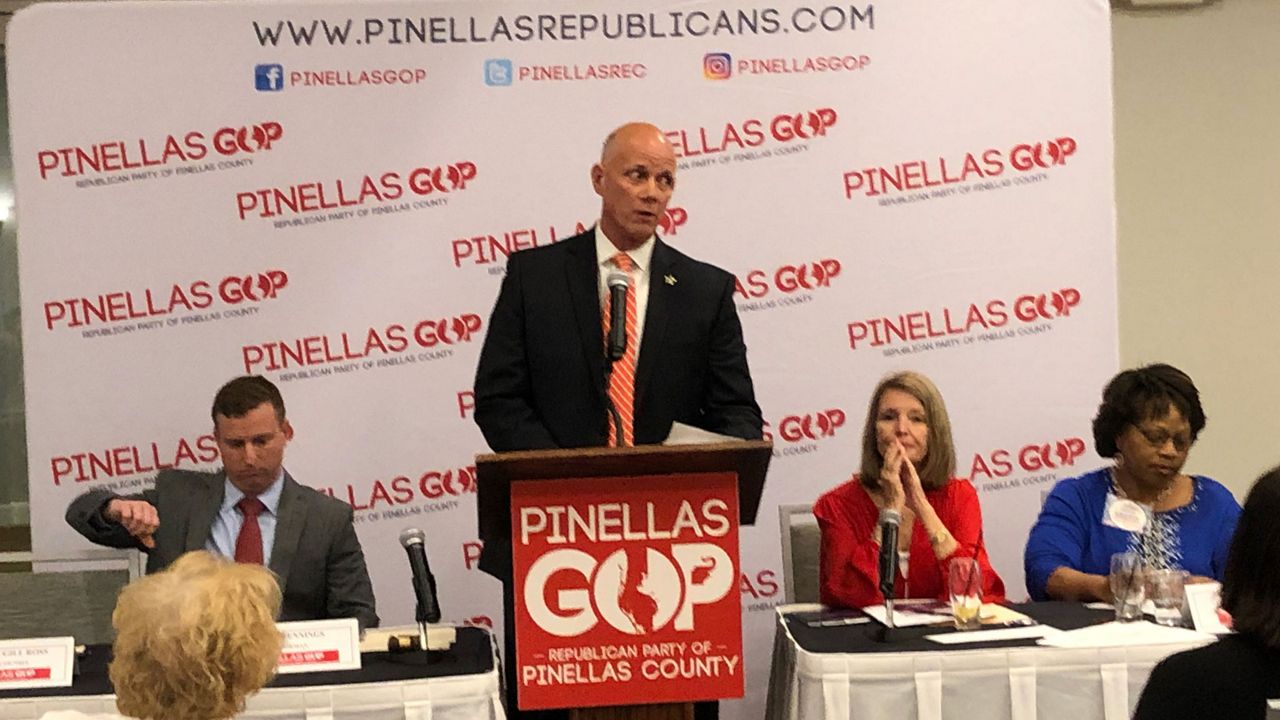ST. PETERSBURG, Fla. — Though there’s been lots of talk about reforming parts of Florida’s criminal justice system in recent years in Tallahassee, there hasn’t been much change.
Nevertheless, Pinellas County Sheriff Bob Gualtieri doesn’t appreciate the idea that some lawmakers think that there’s a need for any substantive reforms, pointing out the fact that crime is the lowest it has been in the Sunshine State in nearly five decades.
- Gualtieri took aim at bills targeting mandatory minimum sentencing, merit-based gain time
- He acknowledged prison system has serious problems, blamed legislature
- More Pinellas County stories
“Make no mistake: we’re not perfect. Show me anybody who is or anything that is and it doesn’t exist,” Gualtieri said while speaking to the Pinellas County Republican Executive Committee in Clearwater on Monday night. “But we’re doing something right. You can look at the data.”
Gualtieri took aim at three proposals introduced in the Legislature in the 2020 session, which is scheduled to end this week but likely will go into next week in order to pass the budget.
A bill that has received the most attention this winter is a proposal sponsored by Orange Park Republican state Senator Rob Bradley (SB 346) that would eliminate mandatory minimum sentences for some non-violent drug offenses.
“Just do away with them?” the sheriff said disgustedly. “So what are we going to do? Just go back to the days where you got this soft judge in Broward County that sees a guy with a kilo of cocaine. 'That’s OK, and you can have probation?' It shouldn’t work that way.”
He went on to say that prosecutors do exercise their discretion when there are extenuating circumstances, saying that some plea bargains can result in a charge of drug possession instead of drug trafficking.
“There is some flexibility in the system,” he said. “So the system is not unjust. The system is not unfair the way that some people would have you believe that it is.”
Bradley, of course, disagrees.
“Sentencing reform for lower-risk drug offenders is the right thing to do, both from a human standpoint and a cost standpoint,” Bradley said in a committee meeting in December.
Another proposal that has faced strong resistance in the Florida House is a proposal that would reduce the minimum amount of time certain inmates are required to serve in prison before they become eligible to be released. First-time non-violent offenders would have the chance to receive merit-based gain time once they’ve reached 65 percent of their sentences. Current law only allows them to get 85 percent of “gain time.”
Gualtieri is not a fan.
“They’ve got no hope, and when they have no hope, they have no incentive to behave. So we need to give them shorter sentences,” he said, mocking the arguments made by advocates for the legislation.
“But what about the damned victims?” he went on. “What about the people who were on the other end of that criminal activity? What about them? We got it backwards. It’s moving too much towards ‘what about the bad guy’ as opposed to focusing on the victims.”
But supporters say it would save millions of dollars.
The Florida Office of Economic and Demographic Research, which evaluates policy for the legislature, conducted an economic study of the proposal when it was pending during last year’s legislative session. The office found that a reduction of nearly 7,600 beds in the Florida Department of Corrections would save nearly $74 million immediately and more than $860 million after five years.
Another proposal Gualtieri objects to is a last-minute amendment tagged onto this year’s school safety bill would require every law enforcement agency to have a written policy that requires supervisory authority to arrest anyone under ten.
The measure was proposed after video of a 6-year-old Kaia Rolle was arrested on charges of misdemeanor battery charges at a school in Orlando after throwing a temper tantrum.
“It was ridiculous,” Gualtieri said of the arrest, but he went on to describe the proposed legislative measure as "knee jerk."
Having said all of that, Gualtieri, the 2019 recipient of Sheriff of the Year Award from the National Sheriffs’ Association, acknowledged that the prison system in Florida has serious problems.
“It’s in trouble because of a failed infrastructure, because of a lack of investment in the Florida Legislature and not paying correction officers,” he offered.



